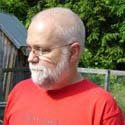I started blogging about ten months ago & we began this blog a little while after that; up to last week, I've always had something to say. Maybe it was the heat, maybe just a late summer malaise brought on by the state of the American government . . . who knows? But rather than post something merely to be posting it, I've held back. This morning, though, I feel a bit more confident of my abilities to write something that's at least coherent. (Actually, part of the blogging block was the realization that I had an audience. For an American poet, this can be a strange sensation. I began the reading & writing weblog literally as a reading journal; the fact that it was written in a public space had the virtue of making me think through what I wrote, but beyond that I had no sense of my readers so I wrote spontaneously. Lately, I find links to my blog & occasionally someone quoting me on another weblog--things that bloggers are supposed to live for--but honestly I find it a little disorienting. Even though I believe that real writers write for an audience, I want to avoid getting caught up in opinion-mongering & get back to reading & writing.) Don't you love it when the parenthesis is longer than the statement?
Your description of seeing Sartre "gesture" struck a chord with me. When I was in my early 20s I fell in love with the late poems of William Carlos Williams. I would read them over to myself both silently & out loud just for the feel of the language. During my first semester in graduate school the poet Donald Justice played our seminar a tape of Williams reading that had been recorded late in his life, after he'd had at least one stroke. Hearing WCW's old man's voice, hesitation, stumbling, raw profoundly changed the way I read the poems. But should it? Do the poems need the voice? No, I don't think they do & if they did they would be mere performance pieces; still, every reader reads a slightly different poem, bringing to the reading an entire world of personal experience, including perhaps the experience of seeing or hearing the author of the words they have studied. Such experience certainly can't be excluded.
I like what you said about the death of the author. It's a notion I grasp & even find occasionally useful intellectually, but as a writer myself it's hard for me to accept in any deep sense: I like myself too much!
Philosophical Investigations
Christopher Robinson & Joseph Duemer read Wittgenstein's Philosophical Investigations


0 Comments:
Post a Comment
<< Home